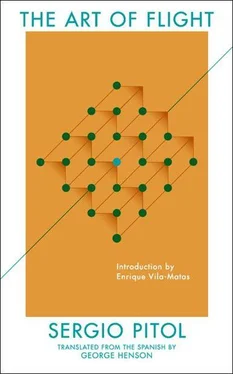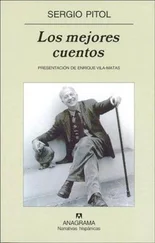Sergio Pitol - The Art of Flight
Здесь есть возможность читать онлайн «Sergio Pitol - The Art of Flight» весь текст электронной книги совершенно бесплатно (целиком полную версию без сокращений). В некоторых случаях можно слушать аудио, скачать через торрент в формате fb2 и присутствует краткое содержание. Год выпуска: 2015, Издательство: Deep Vellum, Жанр: Современная проза, на английском языке. Описание произведения, (предисловие) а так же отзывы посетителей доступны на портале библиотеки ЛибКат.
- Название:The Art of Flight
- Автор:
- Издательство:Deep Vellum
- Жанр:
- Год:2015
- ISBN:нет данных
- Рейтинг книги:5 / 5. Голосов: 1
-
Избранное:Добавить в избранное
- Отзывы:
-
Ваша оценка:
- 100
- 1
- 2
- 3
- 4
- 5
The Art of Flight: краткое содержание, описание и аннотация
Предлагаем к чтению аннотацию, описание, краткое содержание или предисловие (зависит от того, что написал сам автор книги «The Art of Flight»). Если вы не нашли необходимую информацию о книге — напишите в комментариях, мы постараемся отыскать её.
The first work in Pitol's "Trilogy of Memory," The Art of Flight imaginatively blends the genres of fiction and memoir in a Borgesian swirl of contemplation and mystery, expanding our understanding and appreciation of what literature can be and what it can do.
The Art of Flight — читать онлайн бесплатно полную книгу (весь текст) целиком
Ниже представлен текст книги, разбитый по страницам. Система сохранения места последней прочитанной страницы, позволяет с удобством читать онлайн бесплатно книгу «The Art of Flight», без необходимости каждый раз заново искать на чём Вы остановились. Поставьте закладку, и сможете в любой момент перейти на страницу, на которой закончили чтение.
Интервал:
Закладка:
Humor abounds in Hašek’s account: a malignant, barracks humor that emerges more from the belly than the intellect, more characteristic of popular culture than of the refined strata of Bohemian society. Hašek’s laughter comes from the earth and never manages — because neither does he try — to climb upward. A humor centered, to use Bakhtin’s words, on the movements of the belly and the bum. According to the Russian thinker, popular humor has a spring, dawn, and morning character par excellence: “More precisely, folk grotesque reflects the very moment when light replaces darkness, night-morning, winter-spring.”
If the humor that permeates and becomes a foundation of the narrative has this luminous character in the early chapters, where Švejk still remains far from the front, in the last chapters, as the good soldier sinks into battlefields, he changes and connects, even if only in some aspects, with the Romantic root, always present in the Germanic world, where the absence of the solar element is a condition and is the only light capable of penetrating the darkness. The most powerful aspect of German Expressionism was nourished by this violent, blasphemous, and derogatory foundation. Hašek’s world at one point coincides with the vision of George Grosz, Otto Dix, and the early Kokoschka. His tone, says Wolfgang Kayser, “is sinister, dreadful, and distressing.” During Švejk’s journey, the cheerful and luminous tone at the beginning will gradually change signs, and by the time he arrives on the battlefield, it will become fecal. The soldiers march, defecate, kill, defecate again, and, in the end, die, sometimes in the very act of defecating. The war appears as a stage swept by the harshest winds, or reduced to a sordid, drunken brawl like those that might take place at any beer hall in Prague. The adventures and reflections of the delusional character who is Švejk, the dog merchant turned soldier, are resolved through an alchemical pass from dread to laughter. “Fear,” and here I return to Bakhtin, “is the extreme expression of narrow-minded and stupid seriousness, which is defeated by laughter.” Alexander Herzen underscores the revolutionary character of laughter: “No one laughs in church, at court, on parade, before the head of their department, a police officer, or the German boss. House serfs have no right to smile in the presence of their masters, only equals can laugh among themselves. […] To cause men to smile at the god Apis is to deprive him of his holy status and turn him into a common bull.” 21And Victor Hugo adds that the great geniuses of literature distinguish themselves by committing to that which the mediocre avoid: excess and disproportion. Hašek revels in these: Švejk is the embodiment of an absence of limits.
Every era mocks certain subjects that were venerated in the past. Shakespeare laughs at the notion of the heroism contained in the Homeric poems, demolishes epos , and treats the subject as if the immense movement of troops from every corner of the Hellas to the walls of Troy, and the incessant battles where dying meant an act of obedience to the commands of the gods, were nothing more than a frivolous byplay that illustrated the marital conflict between a whore and a cuckold, as attested by the characters of Troilus and Cressida , as splendid as contemptible, the Greek Thersites and the Trojan Pandarus, whose commentaries on war and its leaders are noteworthy for their sarcasm. A very black humor runs through all tragedy. There seems to be an insurmountable rupture between this kind of humor and laughter. The same occurs in the fables of Swift, the work of Beckett, in all of the theater of the absurd. A frozen grimace accompanies their reading. Hašek’s humor is similar. Comparing in the first lines of his novel the most prized offshoot of the Habsburgian dynasty to a collector of street droppings reveals his intention. A few lines suffice to demystify Olympus. The divine Apis suddenly becomes a tame ox.
During the entire course of Švejk’s hazy slog, we never stumble upon anyone who possesses the stuff from which heroes, poets, or saints are made. The vast humanity that inhabits the pages of the novel — the officers who lead the military operations as well as the anonymous starving and drunken multitude that marches toward death — is not characterized by its epic spirit. The world of war is reduced to inarticulate cries, swearing, arrests and corporal punishment, deprivation of every kind, stupidity, robbery, incessant transit from one court to another, from prison to a military commission, from the hospital to the madhouse, from the ward to the battlefield. Amid the roar can be heard Švejk’s indefatigable mumbling. And how reasonable that voice unexpectedly begins to seem to us as it attempts to superimpose itself onto chaos! In a world that has lost all reason Švejk’s incongruent memories, the thousand absurd anecdotes that he reels off in excruciating detail with unrelenting logorrhea seem to border almost on sanity.
The author maintains an attitude of permanent ambiguity toward his creation. Is Švejk, “officially weak-minded — a chronic case,” as he likes to introduce himself, truly mentally retarded, or is he a clever impostor, a sly rogue who manages to fool the authorities all the time? His greatest blunders are always accompanied by an angelic look and an expression of absolute purity. The doubt is never resolved. One of Hašek’s great successes is to never reveal to the reader exactly who Švejk is.
Švejk renders candid testimony of every stop along his judicial odyssey. “Nowadays” he says, “it’s great fun being run in. There’s no quartering or anything of that kind. We’ve got a mattress, we’ve got a table, we’ve got a seat, we ain’t packed together like sardines, we’ll get soup, they’ll give us bread, they’ll bring a pitcher or water, there’s a closet right under our noses. It all shows you what progress there’s been.”
In an edition of the Corriere della Sera from the end of 1987, I read a story about the political perspectives that were visible at that time in Czechoslovakia; the Italian correspondent gathered opinions from writers and artists. Significant changes were beginning to take place in Eastern Europe. Unexpectedly, warm winds were blowing from Russia that seemed to announce that the end of a hibernation that had extended far too long. The Corriere article was titled: “In Prague the soldier Švejk still prevails.” One of the interviewees, whom the Italian journalist referred to by first name only, Ludvik, commented: “The country is rife with Švejkism: it’s a great literary creation, but from a moral point of view, it’s a catastrophe. Czechoslovakia is full of Švejks: hypocrites, opportunists, incompetents. Conformity and concealment know no bounds.” At that time, it was impossible for intellectuals like Ludvik to know if the official lie was exposed, strengthened, and laid bare, precisely because of the work, whether conscious or unconscious, of Švejkism. A falsehood published in the press received so much praise, acceptance, and exaggerated approval by an entire army of complacent Švejks, expressed in a tone that never rid itself of a vague taste of parody that, by contrast, was suggestive of a lie. The official statement, which was repeated with exaggerated emphasis by insane voices, was transformed immediately into a caricature. In the world of the Švejks nonsense is exemplary, an achievement of modern times. Error is extolled as a virtue. Servile adjectivization can reach aberrant levels. Švejk, for example, thinks that a prison system is exemplary because the toilets are placed under the inmates’ noses.
If prison was for Švejk a sign of obvious moral progress, the madhouse then seems to him like a perfect replica of Eden. The protagonist is tireless when singing the magnificence of these tiny paradises. “I’m blowed if I can make out why lunatics kick up such a fuss about being kept there. They can crawl about stark naked on the floor, or caterwaul like jackals, or rave and bite. If you was to do anything like that in the open street, it’d make people stare, but in the asylum it’s just taken as a matter of course. Why, the amount of liberty there is something that even the socialists have never dreamt of. The inmates can pass themselves off as God Almighty or the Virgin Mary or the Pope or the King of England or our Emperor or St. Vaclav, although the one who did him was properly stripped and tied up in solitary confinement. […] I tell you, the life there was a fair treat. You can bawl, or yelp, or sing, or blub, or moo, or boo, or jump, say your prayers or turn somersaults, or walk on all fours, or hop about on one foot, or run round in a circle, or dance, or skip, or squat on your haunches all day long, and climb up the walls. Nobody comes up to you and says: ‘You mustn’t do this, you mustn’t do that, you ought to be ashamed of yourself, call yourself civilized?’ I liked being in the asylum, I can tell you, and while I was there I had the time of my life.” To Švejk, the only access to utopia, then, is found in the world of the insane.
Читать дальшеИнтервал:
Закладка:
Похожие книги на «The Art of Flight»
Представляем Вашему вниманию похожие книги на «The Art of Flight» списком для выбора. Мы отобрали схожую по названию и смыслу литературу в надежде предоставить читателям больше вариантов отыскать новые, интересные, ещё непрочитанные произведения.
Обсуждение, отзывы о книге «The Art of Flight» и просто собственные мнения читателей. Оставьте ваши комментарии, напишите, что Вы думаете о произведении, его смысле или главных героях. Укажите что конкретно понравилось, а что нет, и почему Вы так считаете.












